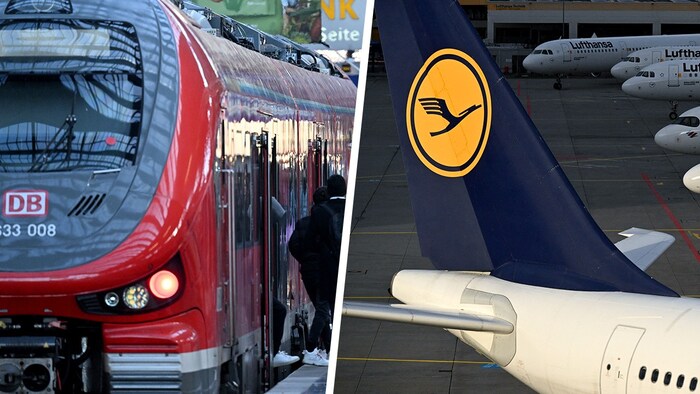Consequences for Austria
German strikes: What travelers need to know now
Travelers in Germany are in for a stressful week. From Thursday morning, thousands of employees at both Deutsche Bahn (DB) and AUA parent company Lufthansa have been called out on strike. Numerous trains and flights are at risk of being canceled, as previous rounds of strikes have already shown. The strikes are also likely to be felt in Austria.
The German train drivers' union GDL with its chairman Claus Weselsky and the service union Verdi are responsible for this. Here are some questions and answers about the recent strikes in German transport.
What can Lufthansa passengers and rail passengers expect?
According to an initial estimate by the Lufthansa Group, around 200,000 passengers will be affected on the two strike days announced by Verdi, Thursday and Friday. This indicates that, as with two previous strike waves, around 1000 flights per day will be canceled and only around a tenth of the original offer can be flown. Due to the simultaneous train drivers' strike, it will also not be possible to switch to rail for shorter routes. At Deutsche Bahn, the strike on long-distance and regional services will begin at 2 a.m. on Thursday and will once again lead to considerable restrictions for millions of travelers. According to the GDL, the strike is set to last until 1 p.m. on Friday. But even after that, it is likely to be some time before all trains are running again as usual. In freight transport, the industrial action will begin on Wednesday evening at 6 pm and is expected to last until Friday at 5 am.
Could things get even worse for air travelers?
Definitely. There is a possibility that the employees of the private aviation security companies at the larger German airports will also join the Lufthansa colleagues' warning strike. Negotiations were still underway on Monday, but a Verdi board spokesperson did not want to rule out the possibility of failure. If there are no staff at the passenger and baggage checkpoints, no passengers will be able to enter the security area of the airports. Employees in Frankfurt, Hamburg, Bremen, Berlin, Leipzig, Düsseldorf, Cologne, Hanover, Stuttgart, Erfurt and Dresden took part in the first warning strike on February 1. The only exception, apart from smaller locations, were the airports in Bavaria, because the inspectors there work in the public sector.
What do rail passengers need to be prepared for?
Deutsche Bahn customers will also have a lot to look forward to in the coming weeks. GDL boss Weselsky no longer wants to announce strikes around 48 hours in advance, as was the case recently. "We will start so-called wave strikes," he said on Monday. He also did not rule out strikes during the upcoming Easter traffic. "This means that the railroads are no longer a reliable means of transport," he said. "It is very likely that the so-called emergency timetable will also not be possible." The railroad had always set up such a hull timetable during previous industrial disputes in the ongoing wage dispute in order to maintain at least a limited service. So far, around 20 percent of long-distance trains have always been running. The impact on regional services varied depending on the region.
Are Verdi and GDL working together?
Both unions deny this. The GDL is not organized in the German Trade Union Confederation (DGB) and competes with the DGB unions Verdi and EVG for members, influence and collective agreements in many transport companies. "We have no level of cooperation," said Verdi strike leader Marvin Reschinsky. Weselsky also emphasized on Bavarian radio on Monday: "We have no agreements with Verdi."
What have Deutsche Bahn and the GDL been negotiating for weeks?
The crux of the wage dispute, which has been smouldering for months, is the GDL's demand for a reduction in weekly working hours for shift workers from 38 to 35 hours without financial losses. Both sides sat together behind closed doors for almost four weeks to find a compromise. Two experienced mediators, former German Interior Minister Thomas de Maizière and Schleswig-Holstein's Minister President Daniel Günther (both CDU), moderated the talks. Without success. Last Thursday, Deutsche Bahn announced that the negotiations had failed again. According to Weselsky, the last proposal on the table from the two mediators included a reduction in working hours to 37 hours and the option of reducing working hours by a further half hour within an existing optional model. The union rejected this. Weselsky refers to wage agreements at more than two dozen smaller railroad companies that have already agreed to the 35-hour demand. However, these agreements are subject to the proviso that Deutsche Bahn also agrees to such a regulation.
What happens now?
That is completely open. On Monday, Weselsky once again ruled out formal arbitration, as recently called for by the passenger association Pro Bahn. "If the two honorable moderators, who are well known to you, have not managed to bring us together, what is the point of another mediation or another moderation?" he said. It is not foreseeable that both sides will sit down at the negotiating table again in the near future. For passengers, the uncertainty on the rails will therefore continue indefinitely.
















Da dieser Artikel älter als 18 Monate ist, ist zum jetzigen Zeitpunkt kein Kommentieren mehr möglich.
Wir laden Sie ein, bei einer aktuelleren themenrelevanten Story mitzudiskutieren: Themenübersicht.
Bei Fragen können Sie sich gern an das Community-Team per Mail an forum@krone.at wenden.